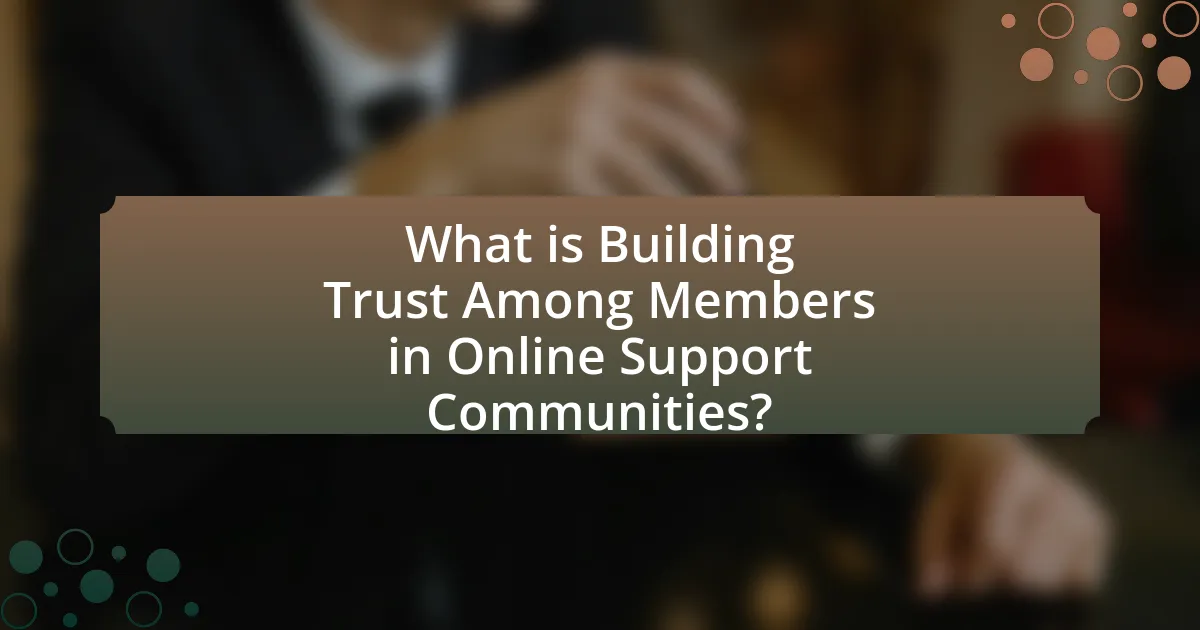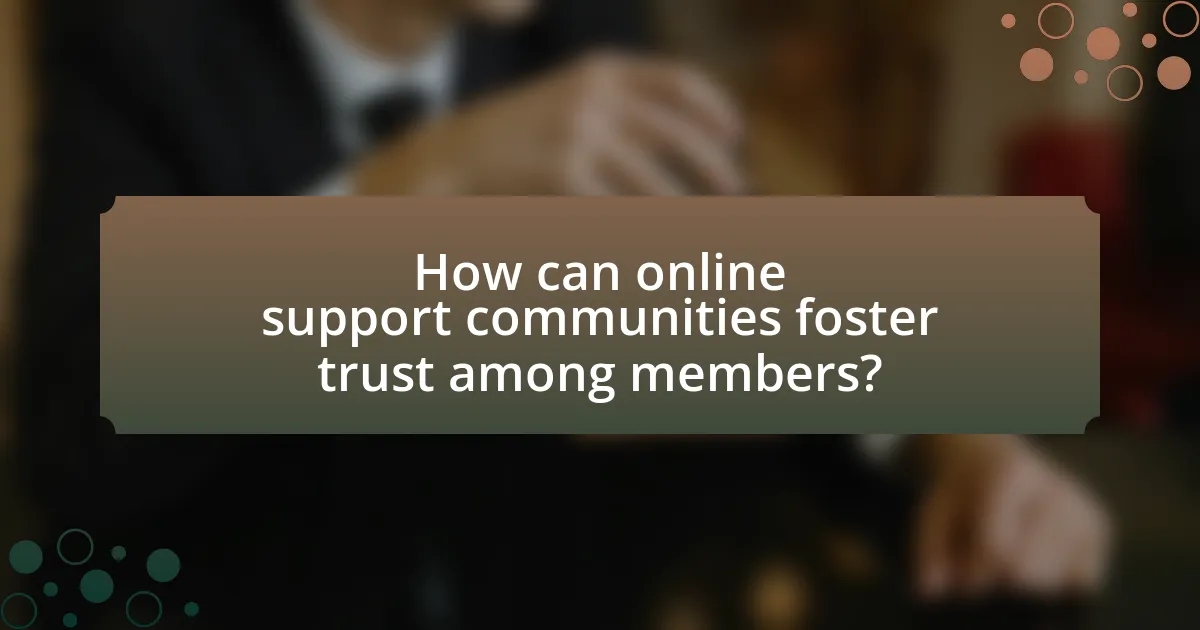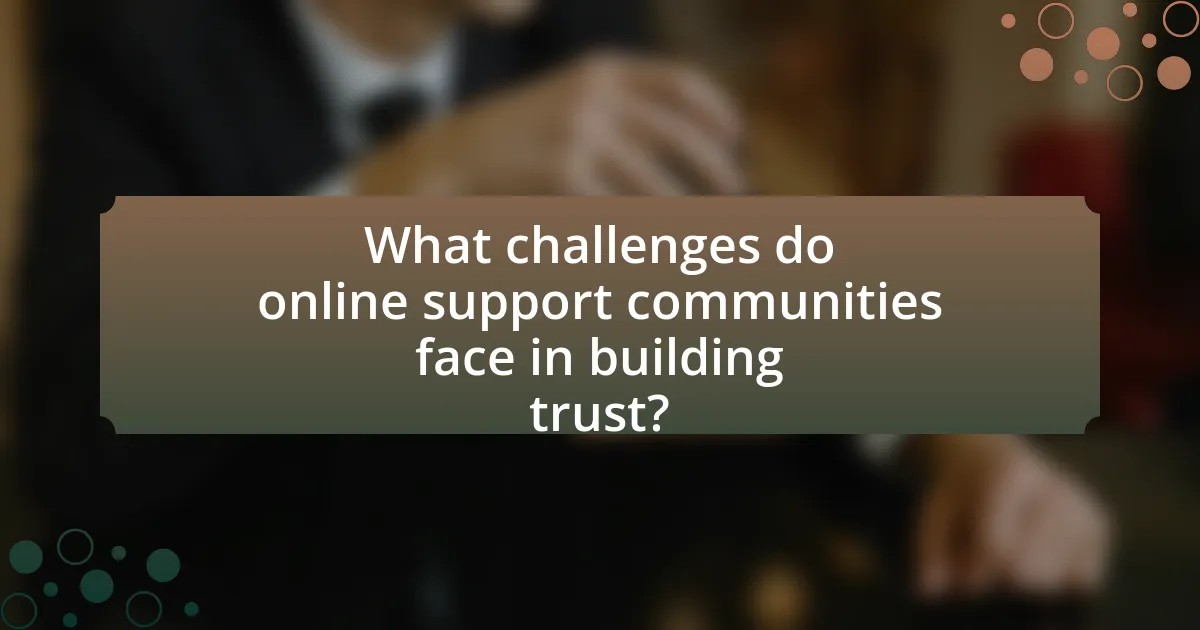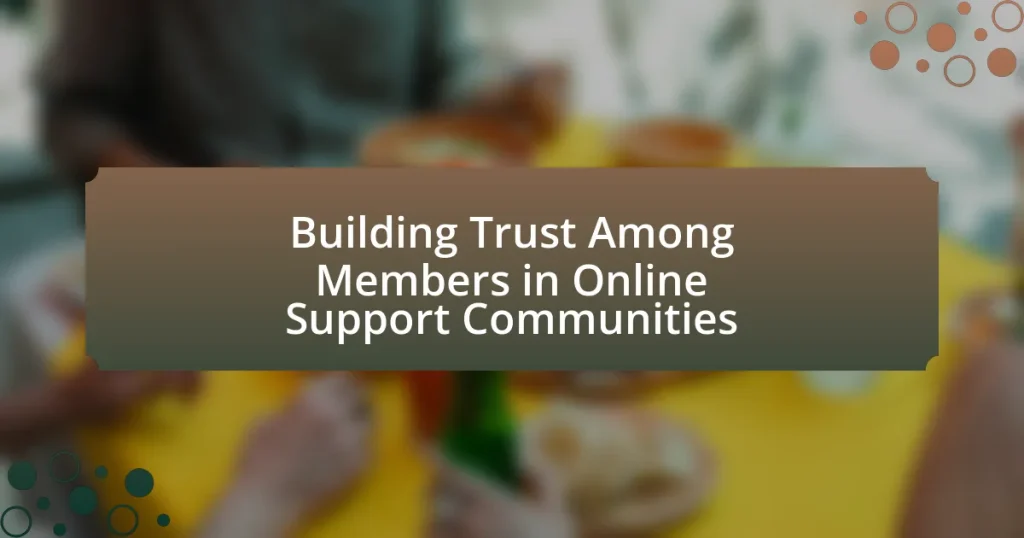Building trust among members in online support communities is essential for fostering a safe and supportive environment where individuals feel valued and respected. The article explores the significance of trust in enhancing member engagement, sharing personal experiences, and creating a sense of belonging. Key elements contributing to trust include transparency, consistency, and empathy, while challenges such as anonymity and misinformation can hinder trust-building efforts. Strategies for fostering trust include promoting open communication, establishing community guidelines, and implementing effective moderation practices. The article emphasizes that overcoming barriers and rebuilding trust after breaches is crucial for maintaining a cohesive and supportive community.

What is Building Trust Among Members in Online Support Communities?
Building trust among members in online support communities involves creating an environment where individuals feel safe, respected, and valued. This is achieved through consistent communication, shared experiences, and mutual support, which fosters a sense of belonging. Research indicates that trust is built when members engage in open dialogue, share personal stories, and provide emotional support, leading to stronger connections and increased participation. For instance, a study published in the Journal of Computer-Mediated Communication found that trust significantly enhances member engagement and satisfaction in online communities, highlighting the importance of trust-building practices.
Why is trust important in online support communities?
Trust is crucial in online support communities because it fosters open communication and sharing among members. When individuals feel secure in their interactions, they are more likely to share personal experiences and seek help, which enhances the overall effectiveness of the community. Research indicates that trust leads to increased engagement; for instance, a study published in the Journal of Computer-Mediated Communication found that higher levels of trust correlate with greater participation and support exchange in online forums. This dynamic not only strengthens relationships but also creates a safe environment where members can discuss sensitive issues without fear of judgment or breach of confidentiality.
What role does trust play in member engagement?
Trust is a critical factor in member engagement within online support communities. When members trust each other and the community as a whole, they are more likely to participate actively, share personal experiences, and seek help. Research indicates that trust fosters a sense of belonging and safety, which encourages open communication and collaboration among members. For instance, a study published in the Journal of Community Psychology found that higher levels of trust correlate with increased member participation and satisfaction in online forums. This demonstrates that trust not only enhances individual engagement but also strengthens the overall community dynamics.
How does trust influence the sharing of personal experiences?
Trust significantly enhances the sharing of personal experiences in online support communities. When individuals feel trust towards others in these communities, they are more likely to disclose intimate details about their lives, which fosters deeper connections and mutual support. Research indicates that trust reduces the perceived risks associated with sharing personal information, leading to increased openness and vulnerability among members. For instance, a study published in the Journal of Computer-Mediated Communication found that higher levels of trust correlate with greater willingness to share personal stories, as trust creates a safe environment where individuals feel understood and accepted.
What are the key elements that contribute to building trust?
The key elements that contribute to building trust include transparency, consistency, and empathy. Transparency involves open communication and sharing information, which fosters a sense of honesty and reliability among members. Consistency refers to the reliability of actions and behaviors over time, reinforcing the belief that individuals will act predictably and fairly. Empathy entails understanding and validating the feelings and experiences of others, creating a supportive environment where members feel valued and understood. Research indicates that these elements are crucial in online support communities, as they enhance member engagement and satisfaction, ultimately leading to stronger trust relationships.
How does transparency affect trust among members?
Transparency significantly enhances trust among members by fostering open communication and accountability. When members share information openly, it reduces uncertainty and builds confidence in each other’s intentions. Research indicates that in online support communities, transparency leads to higher engagement levels, as members feel more secure in expressing their thoughts and experiences. A study published in the Journal of Computer-Mediated Communication found that transparent interactions correlate with increased trust levels, as members perceive a greater sense of belonging and mutual respect. This evidence supports the notion that transparency is a critical factor in establishing and maintaining trust within these communities.
What impact does consistent communication have on trust levels?
Consistent communication significantly enhances trust levels among members in online support communities. When individuals engage in regular, open dialogue, it fosters transparency and reliability, which are essential components of trust. Research indicates that consistent communication leads to increased feelings of safety and belonging, as members feel more connected and informed about each other’s experiences and support. For instance, a study published in the Journal of Computer-Mediated Communication found that communities with high levels of interaction reported stronger trust and cohesion among members. This demonstrates that the frequency and quality of communication directly correlate with the development of trust within these online environments.

How can online support communities foster trust among members?
Online support communities can foster trust among members by promoting open communication and shared experiences. When members engage in honest discussions about their challenges and successes, it creates a sense of belonging and understanding. Research indicates that communities with active participation and transparency in sharing personal stories enhance relational trust, as members feel more connected to one another. Additionally, implementing guidelines for respectful interactions and providing moderation can help maintain a safe environment, further solidifying trust among participants.
What strategies can be implemented to enhance trust?
To enhance trust among members in online support communities, implementing transparent communication is essential. Transparent communication fosters an environment where members feel informed and valued, which is crucial for building trust. Research indicates that communities with clear guidelines and open dialogue experience higher levels of member engagement and trust. For instance, a study published in the Journal of Computer-Mediated Communication found that transparency in communication significantly correlates with trust levels in online communities. Additionally, establishing consistent moderation practices can further enhance trust, as members perceive a fair and safe environment.
How can community guidelines promote a trusting environment?
Community guidelines promote a trusting environment by establishing clear expectations for behavior and communication among members. These guidelines create a framework that encourages respectful interactions, which fosters a sense of safety and belonging. Research indicates that communities with well-defined guidelines experience higher levels of member engagement and satisfaction, as individuals feel more secure in expressing themselves without fear of harassment or judgment. For instance, a study published in the Journal of Computer-Mediated Communication found that communities with explicit rules about conduct saw a 30% increase in positive member interactions, reinforcing the importance of guidelines in cultivating trust.
What role do moderators play in building trust?
Moderators play a crucial role in building trust within online support communities by ensuring a safe and respectful environment for all members. They enforce community guidelines, which helps maintain order and fosters a sense of security among participants. By actively monitoring discussions and addressing inappropriate behavior, moderators demonstrate their commitment to the community’s well-being. Research indicates that communities with effective moderation experience higher levels of member engagement and satisfaction, as members feel valued and protected. This trust is further reinforced when moderators are transparent in their actions and communicate openly with community members, thereby enhancing the overall sense of belonging and support.
How does member interaction contribute to trust-building?
Member interaction significantly contributes to trust-building by fostering open communication and shared experiences among individuals. When members engage with one another, they create a sense of community that enhances mutual understanding and empathy. Research indicates that frequent and meaningful interactions lead to increased perceptions of reliability and support, which are critical components of trust. For instance, a study published in the Journal of Computer-Mediated Communication found that members who actively participated in discussions reported higher levels of trust in the community, as they felt more connected and valued. This connection is essential in online support communities, where trust is foundational for sharing personal experiences and seeking help.
What types of interactions are most effective in fostering trust?
Effective interactions that foster trust include open communication, active listening, and consistent engagement. Open communication allows members to express their thoughts and feelings without fear of judgment, which is crucial in building a safe environment. Active listening demonstrates respect and validation of others’ experiences, reinforcing the sense of community. Consistent engagement, such as regular participation and follow-up on discussions, helps establish reliability and dependability among members. Research indicates that these types of interactions significantly enhance trust levels in online support communities, as they create a foundation of mutual respect and understanding.
How can shared experiences strengthen community bonds?
Shared experiences can strengthen community bonds by fostering a sense of belonging and mutual understanding among members. When individuals participate in common activities or face similar challenges, they create emotional connections that enhance trust and solidarity. Research indicates that shared experiences, such as group discussions or collaborative projects, lead to increased empathy and support, which are crucial in online support communities. For instance, a study published in the Journal of Community Psychology found that participants who engaged in shared activities reported higher levels of trust and cohesion within their groups, demonstrating the positive impact of collective experiences on community dynamics.

What challenges do online support communities face in building trust?
Online support communities face several challenges in building trust, primarily due to anonymity, lack of face-to-face interaction, and the potential for misinformation. Anonymity can lead to users feeling less accountable for their actions, which may result in negative behaviors such as trolling or sharing unverified information. The absence of in-person communication can hinder the development of personal connections, making it difficult for members to gauge the authenticity of others. Additionally, misinformation can spread rapidly in these communities, undermining trust and creating confusion among members. Research indicates that trust is crucial for effective support, as highlighted in a study by Walther et al. (2015), which emphasizes the importance of credibility and relational dynamics in online interactions.
What are common barriers to trust in online environments?
Common barriers to trust in online environments include anonymity, lack of accountability, misinformation, and poor communication. Anonymity can lead to users feeling less responsible for their actions, which may result in dishonest behavior. Lack of accountability arises when users cannot be held responsible for their statements or actions, diminishing trustworthiness. Misinformation, prevalent in many online spaces, can mislead users and erode trust in the information shared. Poor communication, characterized by misunderstandings or lack of clarity, can further hinder the development of trust among community members. These factors collectively create an environment where trust is difficult to establish and maintain.
How do anonymity and privacy concerns affect trust?
Anonymity and privacy concerns significantly impact trust in online support communities by creating a dual-edged effect. On one hand, anonymity allows individuals to share personal experiences and seek help without fear of judgment, fostering openness and vulnerability, which are essential for building trust. For instance, a study published in the Journal of Computer-Mediated Communication found that users are more likely to disclose sensitive information when they feel their identity is protected. On the other hand, excessive anonymity can lead to distrust, as members may question the authenticity and intentions of others, fearing that anonymity could enable harmful behaviors. Research from the Pew Research Center indicates that 64% of internet users believe that anonymity can lead to negative interactions, which can undermine the sense of community and trust. Thus, while anonymity can enhance trust through safety, it can also erode it by fostering skepticism about the reliability of interactions.
What impact do negative experiences have on community trust?
Negative experiences significantly undermine community trust. When members encounter negative interactions, such as conflict or perceived unfairness, their confidence in the community’s reliability and support diminishes. Research indicates that communities with high levels of negative experiences report lower trust levels, as evidenced by a study published in the Journal of Community Psychology, which found that 70% of participants felt less inclined to engage after experiencing conflict. This decline in trust can lead to reduced participation and a fragmented community, ultimately hindering the overall effectiveness of support networks.
How can communities overcome these challenges?
Communities can overcome challenges in building trust among members by implementing structured communication strategies and fostering a culture of transparency. Establishing clear guidelines for interaction encourages respectful dialogue and reduces misunderstandings, which are common barriers to trust. Additionally, regular feedback mechanisms, such as surveys or discussion forums, allow members to voice concerns and contribute to community norms, reinforcing a sense of belonging and accountability. Research indicates that communities with established norms and open communication channels experience higher levels of trust and engagement, as seen in studies on online support groups where members report feeling more connected and supported when they actively participate in shaping community guidelines.
What best practices can be adopted to rebuild trust after breaches?
To rebuild trust after breaches, organizations should prioritize transparency, accountability, and consistent communication. Transparency involves openly sharing details about the breach, including its causes and impacts, which fosters an environment of honesty. Accountability requires acknowledging mistakes and taking responsibility for the breach, demonstrating a commitment to rectify the situation. Consistent communication keeps stakeholders informed about the steps being taken to address the breach and prevent future occurrences. Research indicates that organizations that effectively communicate during crises can restore trust more rapidly; for instance, a study by the Institute for Crisis Management found that timely and honest communication significantly mitigates reputational damage.
How can feedback mechanisms improve trust levels?
Feedback mechanisms can improve trust levels by facilitating open communication and transparency among community members. When individuals receive constructive feedback, it fosters a sense of accountability and encourages positive interactions. Research indicates that communities with established feedback systems report higher trust levels, as members feel their voices are heard and valued. For instance, a study published in the Journal of Community Psychology found that feedback loops significantly enhance member engagement and trust, as participants perceive a commitment to mutual support and improvement. This dynamic creates a more cohesive environment where trust can flourish.
What practical tips can enhance trust among members?
To enhance trust among members in online support communities, establish clear communication guidelines. Clear communication fosters transparency, which is essential for building trust. For instance, research indicates that communities with defined norms for interaction experience higher levels of member engagement and trust (Kraut et al., 2002, “Building Successful Online Communities,” ACM). Additionally, encouraging regular feedback and actively addressing concerns can further solidify trust, as members feel valued and heard.
